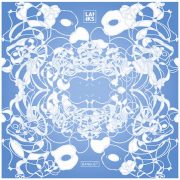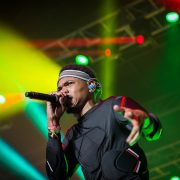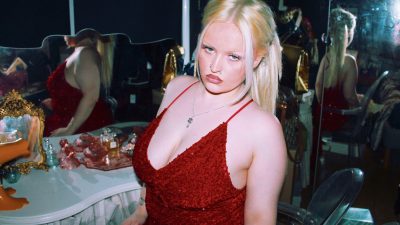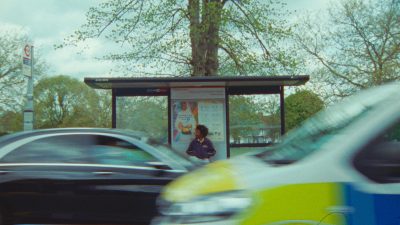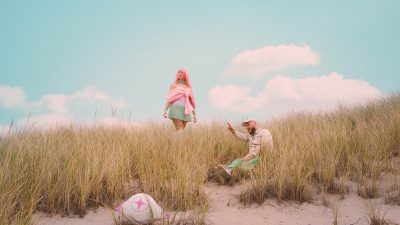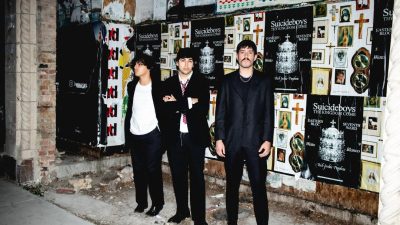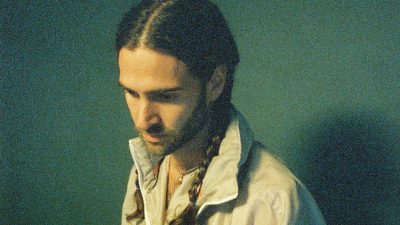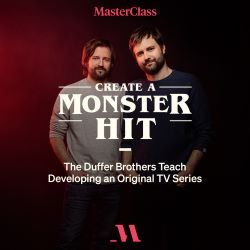Claiming an evolving sound: an interview with Bravestation
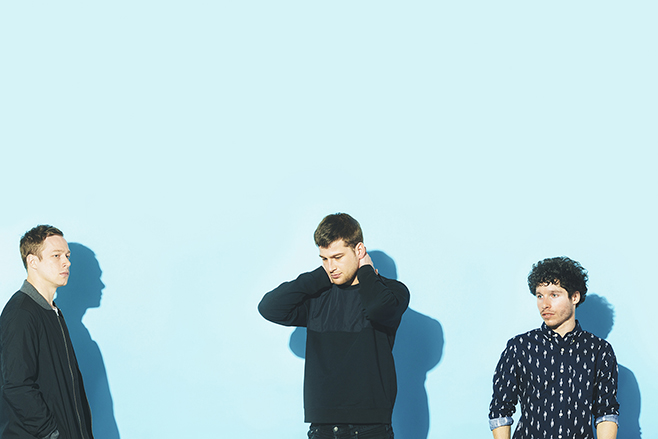
It’s hard to know when to let things go and when to let them simmer. In a way, the boys of Bravestation have become masters of this process, releasing their latest singles, “Actors” and “Haven,” only after taking their time in considering where they’re headed. With a drive that seems to bounce between careful calculation and channeling that inspiring, music-making impulse, they are back with renewed confidence and focus.
From the studio, following the 2012 release of their critically acclaimed album Giants & Dreamers, brothers Derek and Devin Wilson, along with friend Jeremy Rossetti, have crafted new material that not only reflects the new wave, industrial sound for which they’ve become known, but also an evolution in understanding themselves as a band and creative force.
Recently hitting the stage at Toronto’s NXNE festival, Quip had a chance to sit down with all three members to chat about the where the band has been and what’s on the horizon. Here it is:
Laura Eley: Since the release of your last album, Giants & Dreamers, what have you guys been up to?
Derek Wilson: We’ve been focusing on songwriting and finding the sound that we want. It takes time; we’ve been experimenting with styles over the last few EPs. The last record was pretty electronic, very hip-hop influenced, and the record part of that was very experimental with softer ‘80s influences. I think with this [new music], we’re going back to our rock ‘n’ roll roots, so to speak, by using live drums more in the mix and trying to be a band again. You know, rehearsing songs live and creating them as a band, versus with electronic equipment – so that’s been a big change for us. It takes time to write good songs, and we want to take the time.
LE: Do you think releasing songs as singles, versus releasing them together as entire album, changes how music is received?
Devin Wilson: We had a lot of discussions prior to recording these songs and knew that we didn’t want to make an album. We wanted to focus on songs [one at a time] in small groups, instead of a full album, just because we don’t feel like we’re a big enough band for that to be something that’s going to do well. It’s kind of like fishing; seeing what works instead of doing a whole album.
DRW: I think with streaming now, and the fact that we’ve switched from an album-based world where the album cycle was all-important because CDs were actually selling and people were buying music, we’ve switched to the streaming model where it’s an on-demand thing, where people want to listen to songs that they want to listen to. You get caught-up in similar patterns and habits when you create a full body of work, like an album, and have the same tendencies in using the same instrumentation; you’re in that same mindset because you have that small window of opportunity to write the record, and I think getting away from that and [writing music] through singles allows you to be more experimental in the sense that you can try different styles on each track, and you can channel all of your influences over a longer period of time versus having that one cohesive sound that gets played out.
LE: You guys put a lot of thought into your lyrics. How does that affect your songwriting?
DW: Our lyrics always come secondary. We’ll come up with all of the melodies first, and they can just be noises – half of the time they’re not words at all – and sometimes a word will stick, and we’ll just try to write around that.
DRW: It’s like sitting down and writing poetry, as romantic as that idea sounds. It worked for some of the greatest songwriters.
Jeremy Rossetti: In the end, it kind of becomes that.
DRW: You can have a great song without lyrics, but if you’re just singing with no music, you don’t have anything. So, I think the song really dictates and guides the lyrics and influences the feel and vibe.
DW: We don’t really tell linear stories. It’s not like we have this idea for a song that’s a story; we kind of try to [place] abstract ideas throughout, it could be a bunch of stories. It’s not like Bob Dylan, you know?
LE: What types of other art influence your music?
DW: Definitely films, I would say. Literature; there’s a couple books that have really stuck with us over the years, a lot of dystopia, like 1984…that type of stuff.
LE: Why dystopia?
DRW: It’s almost foreshadowing, potentially, what we’re moving towards. But, finding hope and meaning and happiness and love and care in that dark and disturbing world that arguably parallels what we live in now, capitalism and people chasing the almighty dollar on a day-to-day basis; it’s kind of a way to poke fun at that and build a narrative.
LE: What inspires you to come-up with new ideas when you’re in a creative rut?
DW: We’re lucky in that we have never really fallen into ruts, we’re always able to write songs, although they’re not always necessarily good. We kind of went through a rut in the songs that we scrapped. There were probably 10 altogether that we just didn’t think were good enough or a good follow-up to what we had written prior to that. We wanted to take a step up instead of just side-to-side, and it didn’t feel like those songs were doing that. It was frustrating to let all that music go and know that work was gone.
LE: How do you know when it’s time to scrap a song?
DRW: I think it goes back to what inspires us to make music – it’s listening to other music. That’s ultimately what inspires you. We’re heavily influenced by other artists and songs. We look up to other musicians for inspiration, and when we create music that maybe doesn’t stand up to that quality of the music that we’re listening to, it’s pretty audibly discernable to say if a song is not as good as the artist that’s influencing us or artists that we look up to. That makes it an easy decision.
LE: What advice would you give new artists who are performing live for the first time?
DW: It’s just about playing shows. The best thing is getting experience and playing in all sizes of venues, getting the experience of setting up with different acts and learning where things can go wrong and things can go right.
LE: It’s very similar to acting.
DRW: Totally. You’re developing those live performance muscles and you just get more and more comfortable. I mean we’ve been doing it for a long time, but we’re just now beginning to work on things like stage presence and getting better at playing our instruments live when there’s the pressure of an audience, a full room watching you. You’re always trying to make small improvements, but it just comes down to playing [as much as possible].
LE: What’s up next?
DRW: We’re just in the planning stages right now, we’re sitting on a bunch of new music and we’re just trying to put a tour in place and rollout a promotional strategy that makes sense and get a PR team onboard. I think we’ll be on the radio in the fall. It’s a cycle; we’ll probably be doing the same thing next year and the year after that. There are only so many marketing and promotional avenues that exist for artists, everyone’s kind of doing the same thing, you release music, put some promotional efforts into it, play some shows, then you do it all over again.


